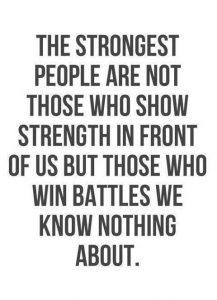When we hear someone say, “He’s a strong person,” or “She has great inner strength,” it can mean different things to each of us. The word “strong” has a wide variety of definitions available for it, but the one(s) I want to concentrate on here are those relating to strength of character; strength of spirit. Hands down the largest message I want to impart in this piece is that just because someone appears to be strong… behaves in a manner that expresses a greater inner strength… is constantly helping others, DOES NOT mean that they aren’t fighting their own battles.
That behavioral characteristic – showing strength in front of others even when facing some type of inner challenge – is both an awesome thing and potentially very negative at the same time. I know that doesn’t seem to make much sense, but let’s talk about it for a minute.
We all know those people who, when we need help, a sympathetic ear, some words of wisdom, etc. they are there and willing. It seems like no matter what is going on in their daily life, they have time or they make time. They listen, offer advice as necessary, or simply let you vent until you feel better… or you come to the realization that you’re just whining and stop doing it. The point is that no matter what else is going on, they make time to help someone in some way. They do that even when they are facing some kind of challenge themselves. They could be having a really bad day, just lost a loved one, just fell on some stairs and are in pain… it doesn’t matter. They make themselves available.
 Those people are strong but maybe not in the way we think. They aren’t so strong they’ve overcome every challenge and “mastered life.” They are strong in the sense that they have accepted whatever challenge they’re facing, developed a plan for managing or overcoming it and then set aside the stress normally associated with unexpected or unmanaged challenges. What they HAVE actually mastered are the tenets of the Serenity Prayer: they have accepted what they cannot change; they are confident in their strength to change or manage what they have control over; and they’ve found the wisdom to recognize the difference. That mastery creates a freedom: freedom from the stress that is associated with unexpected or seemingly insurmountable challenges. That is definitely a strength and we may not see it. Without knowledge of whatever challenges they are facing, we have no way of knowing what they’re overcoming or setting aside to help others.
Those people are strong but maybe not in the way we think. They aren’t so strong they’ve overcome every challenge and “mastered life.” They are strong in the sense that they have accepted whatever challenge they’re facing, developed a plan for managing or overcoming it and then set aside the stress normally associated with unexpected or unmanaged challenges. What they HAVE actually mastered are the tenets of the Serenity Prayer: they have accepted what they cannot change; they are confident in their strength to change or manage what they have control over; and they’ve found the wisdom to recognize the difference. That mastery creates a freedom: freedom from the stress that is associated with unexpected or seemingly insurmountable challenges. That is definitely a strength and we may not see it. Without knowledge of whatever challenges they are facing, we have no way of knowing what they’re overcoming or setting aside to help others.
But how could showing such strength be a negative thing? Well, it depends on how the person showing that strength is actually managing whatever challenge(s) they’re facing. If they’re able to show that strength because they are denying a challenge, or simply ignoring it in the hopes that it will either go away or not have an impact on them, then they aren’t managing it at all. They’re in denial and distracting themselves from whatever challenge they face by helping others. While that benefits the others, it doesn’t ultimately help that person we’re all perceiving as strong.
That person’s façade of control and strength isn’t doing them any good if they’re in denial or simply ignoring a serious challenge in their life. The truly strong people acknowledge the challenges; face them; manage them; take appropriate action to mitigate or correct them. And then on top of doing that they find the time and motivation to help others.
THOSE are the truly strong people. They are the people who are hurt, emotionally strained, mentally fatigued and more… yet they still dig down and find the intestinal fortitude to help those around them; someone who they perceive in greater need of assistance than themselves.
The big question is: which are you?
First (and this is rhetorical obviously), do you help others? Do you offer a kind ear? Do you offer guidance or advice? Are you a mentor for anyone?
Second, if so, are you managing your own challenges first? Because if not, you may be helping others but the assistance you offer may well be tainted with the spill-over negativity of the challenge(s) you are ignoring in your own life. To offer the best assistance and guidance, we first have to manage our own challenges.
And while we like to think we are putting up a great appearance of strength and fantastic stress management skills, if that’s not true then we’re only fooling those who don’t truly know us. Our family members, close friends and trusted work associates know the difference. They are the ones who come and ask what’s wrong even when you think you’re acting like everything is fine. They can sense the stress vibrations coming off you and know that you’re not really “Okay.”
So, what we’ve discovered through the course of this piece is that if you want to be a truly strong person, you first have to acknowledge your own challenges, weaknesses, stressers, etc. You have to see them for what they are, identify them as something you can control or just have to accept, and then act appropriately. Only when you’ve managed your own challenges can you offer anyone assistance in dealing with theirs.


